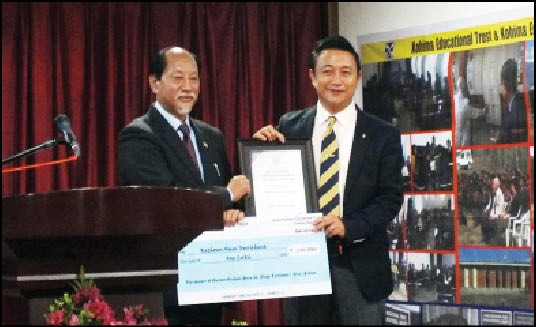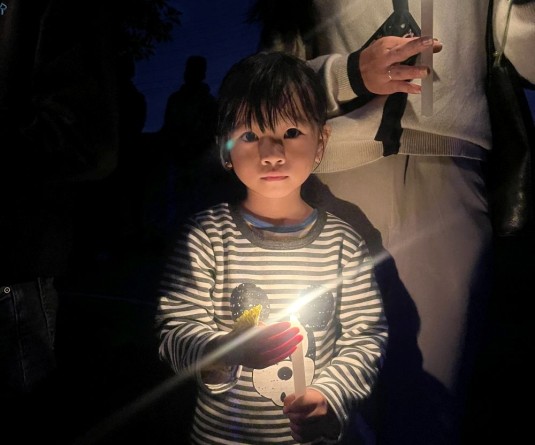Kethoser Aniu Kevichusa receiving the Gordon Graham Prize from Chief Minister of Nagaland at Hotel Vivor on April 9. (Morung Photo)

Morung Express News
Kohima | April 9
“If this award can be an iota of contribution for the healing of the nations, then all our exercises will be worth our while,” said Kethoser Aniu Kevichusa today while receiving and dedicating the Gordon Graham Prize for Naga Literature in the non-fiction category to the living family members of all those who have been killed in the political conflicts that have ravaged the land of the Nagas, including the living families of the Indian military forces, the Burmese forces and officers who lost their lives.
Kevichusa was awarded for his book ‘Forgiveness and Politics: A Critical Appraisal.’ He recalled that in the 1950s his maternal grandfather was killed by Naga nationalists because he was a government servant. In the nineties, two of his paternal uncles were assassinated over issues related to Naga politics. But in both cases, he said, their family chose to forgive. Ever since, his reflections on forgiveness and its implication on politics led him to the research that gave birth to this book.
He was speaking at the award function held at Hotel Vivor here as part of the 75th anniversary celebration of the Battle of Kohima under the theme ‘Remembrance, Reconciliation and Rebirth.’
Elaborating on the basic thesis of his book, he said, “in a political context where there are differences and conflicting interests and ideologies and visions, there are two basic ways of resolving our differences and our conflict- one is go to war and the other is to do politics.” By politics, he explained, “we simply mean the art, the craft- of negotiation, dialogue, give and take, talking to people we’d rather kill, listening to views that we disagree with, accepting arrangements that are less than ideal. That is the art of politics.”
“My basic argument is if we are to do politics and if we are to get a political settlement then whether we use the word forgiveness or not, forgiveness must be an incorporated principle. And very interestingly, even in the Naga context, since 1957, there have been people, including my grandfather, who maintained that the only answer to the Naga question is a satisfactory political settlement. That is basically the thesis of my work,” he noted.
Also mentioning his three sons, Kevichusa said, “This is a book for them that they might live and work, that they might write and read in a more secure, peaceful and fairer Nagaland.”
Dr. Joyce Zinyü, who read out the acceptance speech on behalf of Easterine Kire, who was awarded the Gordon Graham Prize for Naga Literature in the fiction category for her book ‘When the River Sleeps,’ said it was a great honour to be selected for the prestigious award.
She mentioned about having met Gordon Graham when he was alive, describing him as a most generous and wise man, full of love and concern for the Naga people. “Keeping his memory alive by instituting this prize in his name is a wonderful action taken by the KET,” she said.
She also recalled Lily Das, who along with Gordon Graham worked very hard for the KET to realize its plans for the Nagas while stating that their dreams have borne good fruit today.
“We, the Nagas are grateful for the programs introduced by the KET to support underprivileged and deserving students in our areas,” she expressed.




